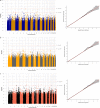Genome-wide association study of antidepressant treatment resistance in a population-based cohort using health service prescription data and meta-analysis with GENDEP
- PMID: 30700811
- PMCID: PMC7096334
- DOI: 10.1038/s41397-019-0067-3
Genome-wide association study of antidepressant treatment resistance in a population-based cohort using health service prescription data and meta-analysis with GENDEP
Abstract
Antidepressants demonstrate modest response rates in the treatment of major depressive disorder (MDD). Despite previous genome-wide association studies (GWAS) of antidepressant treatment response, the underlying genetic factors are unknown. Using prescription data in a population and family-based cohort (Generation Scotland: Scottish Family Health Study; GS:SFHS), we sought to define a measure of (a) antidepressant treatment resistance and (b) stages of antidepressant resistance by inferring antidepressant switching as non-response to treatment. GWAS were conducted separately for antidepressant treatment resistance in GS:SFHS and the Genome-based Therapeutic Drugs for Depression (GENDEP) study and then meta-analysed (meta-analysis n = 4213, cases = 358). For stages of antidepressant resistance, a GWAS on GS:SFHS only was performed (n = 3452). Additionally, we conducted gene-set enrichment, polygenic risk scoring (PRS) and genetic correlation analysis. We did not identify any significant loci, genes or gene sets associated with antidepressant treatment resistance or stages of resistance. Significant positive genetic correlations of antidepressant treatment resistance and stages of resistance with neuroticism, psychological distress, schizotypy and mood disorder traits were identified. These findings suggest that larger sample sizes are needed to identify the genetic architecture of antidepressant treatment response, and that population-based observational studies may provide a tractable approach to achieving the necessary statistical power.
Conflict of interest statement
AMM has received financial support from Pfizer (formerly Wyeth), Janssen and Lilly and from the Sackler trust. The remaining authors declare that they have no conflict of interest.
Figures


Similar articles
-
Polygenic risk scores for major depressive disorder and neuroticism as predictors of antidepressant response: Meta-analysis of three treatment cohorts.PLoS One. 2018 Sep 21;13(9):e0203896. doi: 10.1371/journal.pone.0203896. eCollection 2018. PLoS One. 2018. PMID: 30240446 Free PMC article.
-
Dissection of major depressive disorder using polygenic risk scores for schizophrenia in two independent cohorts.Transl Psychiatry. 2016 Nov 1;6(11):e938. doi: 10.1038/tp.2016.207. Transl Psychiatry. 2016. PMID: 27801894 Free PMC article.
-
Higher polygenic risk scores for schizophrenia may be suggestive of treatment non-response in major depressive disorder.Prog Neuropsychopharmacol Biol Psychiatry. 2021 Jun 8;108:110170. doi: 10.1016/j.pnpbp.2020.110170. Epub 2020 Nov 10. Prog Neuropsychopharmacol Biol Psychiatry. 2021. PMID: 33181205
-
Understanding the genetic aspects of resistance to antidepressants treatment.Eur Rev Med Pharmacol Sci. 2020 Jul;24(14):7784-7795. doi: 10.26355/eurrev_202007_22281. Eur Rev Med Pharmacol Sci. 2020. PMID: 32744705 Review.
-
European Group for the Study of Resistant Depression (GSRD)--where have we gone so far: review of clinical and genetic findings.Eur Neuropsychopharmacol. 2012 Jul;22(7):453-68. doi: 10.1016/j.euroneuro.2012.02.006. Epub 2012 Mar 30. Eur Neuropsychopharmacol. 2012. PMID: 22464339 Review.
Cited by
-
Genetic factors and symptom dimensions associated with antidepressant treatment outcomes: clues for new potential therapeutic targets?Eur Arch Psychiatry Clin Neurosci. 2024 Aug 27. doi: 10.1007/s00406-024-01873-1. Online ahead of print. Eur Arch Psychiatry Clin Neurosci. 2024. PMID: 39191930 Review.
-
Pharmacogenetics and Depression: A Critical Perspective.Psychiatry Investig. 2019 Sep;16(9):645-653. doi: 10.30773/pi.2019.06.16. Epub 2019 Aug 29. Psychiatry Investig. 2019. PMID: 31455064 Free PMC article.
-
Exploring depression treatment response by using polygenic risk scoring across diverse populations.Am J Hum Genet. 2025 Aug 7;112(8):1877-1891. doi: 10.1016/j.ajhg.2025.06.003. Epub 2025 Jun 27. Am J Hum Genet. 2025. PMID: 40580956
-
Identifying the Common Genetic Basis of Antidepressant Response.Biol Psychiatry Glob Open Sci. 2022 Apr;2(2):115-126. doi: 10.1016/j.bpsgos.2021.07.008. Biol Psychiatry Glob Open Sci. 2022. PMID: 35712048 Free PMC article.
-
The prediction of Alzheimer's disease through multi-trait genetic modeling.Front Aging Neurosci. 2023 Jul 27;15:1168638. doi: 10.3389/fnagi.2023.1168638. eCollection 2023. Front Aging Neurosci. 2023. PMID: 37577355 Free PMC article.
References
-
- Ustün T, Ayuso-Mateos J, Chatterji S, Mathers C, Murray C. Global burden of depressive disorders in the year 2000. Br J Psychiatry. 2004;184:386–92. - PubMed
-
- Global Burden of Disease Study 2013 Collaborators. Global, regional, and national incidence, prevalence, and years lived with disability for 301 acute and chronic diseases and injuries in 188 countries, 1990-2013: a systematic analysis for the Global Burden of Disease Study 2013. Lancet. 2015;386:743–800. - PMC - PubMed
-
- Rush A, Trivedi M, Wisniewski S, Nierenberg A, Stewart J, Warden D, et al. Acute and longer-term outcomes in depressed outpatients requiring one or several treatment steps: a STAR*D report. Am J Psychiatry. 2006;163:1905–17. - PubMed
-
- Uher R, Perroud N, Ng MY, Hauser J, Henigsberg N, Maier W, et al. Genome-wide pharmacogenetics of antidepressant response in the GENDEP project. Am J Psychiatry. 2010;167:555–64. - PubMed
Publication types
MeSH terms
Substances
Grants and funding
LinkOut - more resources
Full Text Sources
Medical

